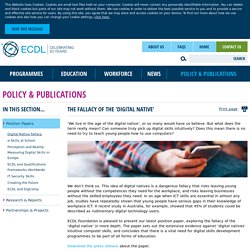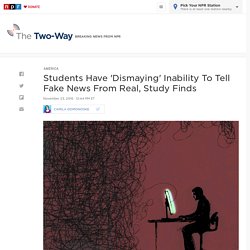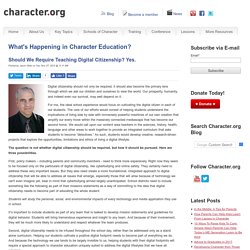

The Fallacy of the 'Digital Native' - ICDL - International Computer Driving Licence. ‘We live in the age of the digital native’, or so many would have us believe.

But what does the term really mean? Can someone truly pick up digital skills intuitively? Does this mean there is no need to try to teach young people how to use computers? We don’t think so. This idea of digital natives is a dangerous fallacy that risks leaving young people without the competences they need for the workplace, and risks leaving businesses without the skilled employees they need. ECDL Foundation is pleased to present our latest position paper, exploring the fallacy of the ‘digital native’ in more depth. Download the press release about the paper. You can read our position paper here.
We have also published a post on our blog about the 'digital native' fallacy. The Fallacy of the Digital Native. 4 Great Fact Checking Sites 2017. 5 Ways to Help Kids Deal with Disturbing News. Helping Kids Separate Fact from Fiction in the News. Our New Research Shows Where Kids Get Their News and How They Feel About It. The news isn't what it used to be. What was once shared by newspapers, radio, and TV now comes in Snapchat stories, on Facebook Live broadcasts, in Twitter conversations, and through other new forms of communication. But parents still want -- and need -- their kids to be good citizens. To an extent, that means kids must understand what's happening in the world and apply critical-thinking skills to information in all its forms and from all sources.
Common Sense Media is one of the only organizations to conduct a large-scale study of how kids get their news, engage with it, and feel about it. Our report, News and America's Kids: How Young People Perceive and Are Impacted by the News, is designed to help parents, teachers, and policymakers support kids in a 21st-century world, where finding, identifying, evaluating, and using information effectively will be critical. Kids and Tech: The New Landscape. For Parents & Caregivers. News and America's Kids Infographic. 4 Ways to Help Kids Make Sense of Breaking News Video. 5 Ways to Help Kids Deal with Disturbing News Video. Can You Tell Fake News From Real? Study Finds Students Have 'Dismaying' Inability.
Stanford researchers assessed students from middle school to college and found they struggled to distinguish ads from articles, neutral sources from biased ones and fake accounts from real ones.

Gary Waters/Ikon Images/Getty Images hide caption toggle caption Gary Waters/Ikon Images/Getty Images Stanford researchers assessed students from middle school to college and found they struggled to distinguish ads from articles, neutral sources from biased ones and fake accounts from real ones. If the children are the future, the future might be very ill-informed. That's one implication of a new study from Stanford researchers that evaluated students' ability to assess information sources and described the results as "dismaying," "bleak" and "[a] threat to democracy.
" As content creators and social media platforms grapple with the fake news crisis, the study highlights the other side of the equation: What it looks like when readers are duped. "The photograph had no attribution. Should We Require Teaching Digital Citizenship? Yes. Digital citizenship should not only be required, it should also become the primary lens through which we ask our children and ourselves to view the world.

Our prosperity, humanity, and indeed even our survival, may well depend on it. For me, the ideal school experience would focus on cultivating the digital citizen in each of our students. The core of our efforts would consist of helping students understand the implications of living side by side with immensely powerful machines of our own creation that amplify our every move within the massively connected mediascape that has become our second home. We would call upon our content area teachers in the sciences, history, health, language and other areas to work together to provide an integrated curriculum that asks students to become “detectives.”
As such, students would develop creative, research-driven projects that explore the opportunities, limitations and ethics of living a digital lifestyle.
PT 5 Great Online News Sources For Kids.